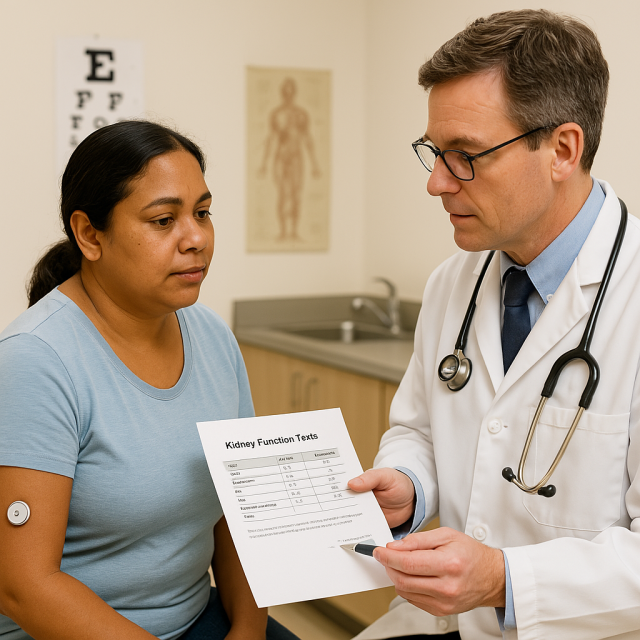Imagine managing a patient’s blood sugar levels perfectly, only to discover their kidneys are silently deteriorating. Could better glycemic control have prevented this? Kidney disease is one of the most serious and common complications faced by individuals with diabetes, yet its early signs often go unnoticed.
For healthcare professionals treating diabetic patients, understanding this connection is crucial. Not only does it guide better prevention strategies, but it also enables timely interventions that could save lives—and kidneys.
Table of Contents
- The Interplay Between Diabetes and Kidney Disease
- Pathophysiology: How Diabetes Harms the Kidneys
- Diagnostic and Treatment Approaches
- Enhancing Patient Outcomes Through Multidisciplinary Care
The Interplay Between Diabetes and Kidney Disease
Diabetes remains the leading cause of chronic kidney disease (CKD) globally. According to the CDC, approximately 1 in 3 adults with diabetes has CKD. This alarming statistic emphasizes how vital it is for clinicians to address renal health during routine diabetic care.
The two primary types of diabetes—Type 1 and Type 2—can both impair renal function. Over time, high blood glucose levels damage the glomeruli, the kidney’s filtering units. Initially, this damage manifests as microalbuminuria, which, if left untreated, progresses to overt nephropathy and eventually end-stage renal disease (ESRD).
Interestingly, the link between kidney and cardiovascular health also adds another layer of complexity. Diabetic kidney disease (DKD) significantly increases the risk of cardiovascular events. This makes it imperative for clinicians to manage diabetes holistically, not just focusing on glycemia but also on blood pressure, lipid levels, and renal function.
Pathophysiology: How Diabetes Harms the Kidneys
Understanding the mechanisms behind diabetic nephropathy helps clinicians take a proactive approach to treatment. The chronic hyperglycemic state triggers several pathways that damage kidney structures:
Key Mechanisms of Damage
- Glomerular Hyperfiltration: Initially, kidneys filter too much blood, which stresses the glomeruli.
- Advanced Glycation End Products (AGEs): These molecules contribute to thickening of the glomerular basement membrane and promote inflammation.
- Protein Kinase C Activation: Leads to increased production of growth factors and cytokines, contributing to fibrosis.
- Renin-Angiotensin-Aldosterone System (RAAS): Its overactivation worsens glomerular pressure and leakage of protein into urine.
These mechanisms set off a cascade of events that ultimately culminate in glomerulosclerosis and interstitial fibrosis—hallmarks of kidney disease. Fortunately, with early recognition and targeted therapies, progression can often be slowed or even halted.
Diagnostic and Treatment Approaches
Routine screening plays a pivotal role in identifying CKD in diabetic patients before irreversible damage occurs. Annual urine albumin-to-creatinine ratio (UACR) and estimated glomerular filtration rate (eGFR) assessments are essential.
Current Treatment Options
Several pharmacologic interventions have transformed how clinicians manage diabetic patients at risk of kidney disease:
- ACE inhibitors (e.g., lisinopril) and ARBs (e.g., losartan) reduce intraglomerular pressure and proteinuria.
- SGLT2 inhibitors (e.g., dapagliflozin, empagliflozin) offer renal protection beyond glycemic control.
- GLP-1 receptor agonists (e.g., semaglutide, liraglutide) reduce inflammation and improve metabolic parameters.
- Non-steroidal mineralocorticoid receptor antagonists (e.g., finerenone) have shown promise in reducing CKD progression.
In patients with hypertension, achieving a target blood pressure of <130/80 mmHg is strongly recommended. Equally, glycemic targets must be individualized to prevent hypoglycemia while minimizing renal damage.
Monitoring and adjusting drug dosages based on eGFR is another key component. For instance, metformin should be avoided in patients with significantly reduced kidney function due to the risk of lactic acidosis.
Enhancing Patient Outcomes Through Multidisciplinary Care
Managing kidney disease in diabetes isn’t the sole responsibility of endocrinologists or nephrologists. Instead, a coordinated, team-based approach yields the best outcomes.
Primary care physicians, diabetes educators, pharmacists, dietitians, and mental health professionals all have vital roles. Collaborative care ensures that patients adhere to dietary recommendations, manage their medications properly, and stay motivated.
Incorporating patient forums and support resources like Healing Well’s health forums can also empower patients through shared experiences and advice.
Furthermore, clinicians should encourage patients to engage in lifestyle modifications: reducing sodium intake, increasing physical activity, and quitting smoking. These small changes can dramatically slow CKD progression.
For educational resources, refer patients to Diabetes in Control where they can find articles, tools, and updates on managing diabetes and related complications.
Conclusion
Kidney disease in diabetic patients is both common and dangerous, yet largely preventable with the right clinical approach. Through early detection, evidence-based treatments, and a patient-centered care model, healthcare professionals can dramatically alter the trajectory of CKD in their patients.
In an age where precision medicine is gaining ground, treating the diabetic kidney demands vigilance, empathy, and a collaborative mindset. Every clinician has the power to make a measurable difference—starting with the next routine check-up.
Frequently Asked Questions
1. How often should diabetic patients be screened for kidney disease?
Annually, using the urine albumin-to-creatinine ratio and estimated GFR to monitor early changes.
2. Can kidney disease be reversed in diabetic patients?
While complete reversal is rare, early intervention can halt or significantly slow progression.
3. Which diabetes medications are kidney-friendly?
SGLT2 inhibitors like empagliflozin and GLP-1 receptor agonists like semaglutide have shown renal benefits.
4. Is it safe to use metformin in patients with CKD?
Only in patients with mild to moderate CKD; it should be discontinued when eGFR drops below 30 mL/min/1.73m².
5. How can clinicians support lifestyle changes in patients?
Use motivational interviewing, referrals to dietitians, and online support groups like Healing Well.
Disclaimer:
This content is not medical advice. For any health issues, always consult a healthcare professional. In an emergency, call 911 or your local emergency services.
